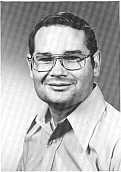JEFF KELLY
 My academic interests have always been in the sciences. As an undergraduate
at Harvey Mudd College my classes in physics and chemistry progressed to
a project in photochemistry which stimulated an interest in the interaction
of light with matter. At the University of California at Berkeley,
I began studies in the biological aspects of these interactions. My thesis
work was on the fundamental processes of photosynthesis (with help from
several tons of spinach) and I received a Ph.D. in Chemistry in 1968. My
specific interests are in the processes of photosynthesis and photobiology,
the biochemical stability of thermophilic organisms, and the analytical
aspects of environmental chemistry. Since leaving Berkeley I have
been teaching chemistry and biochemistry at Reed College in Portland, Oregon.
At Reed I was engaged in teaching a required science-for-nonscience majors
course which typified many of the problems of a normal course-structured
curriculum. From these teaching experiences developed an interest in finding
meaningful ways of teaching science to undergraduates and eventually my
interest in Evergreen.
My academic interests have always been in the sciences. As an undergraduate
at Harvey Mudd College my classes in physics and chemistry progressed to
a project in photochemistry which stimulated an interest in the interaction
of light with matter. At the University of California at Berkeley,
I began studies in the biological aspects of these interactions. My thesis
work was on the fundamental processes of photosynthesis (with help from
several tons of spinach) and I received a Ph.D. in Chemistry in 1968. My
specific interests are in the processes of photosynthesis and photobiology,
the biochemical stability of thermophilic organisms, and the analytical
aspects of environmental chemistry. Since leaving Berkeley I have
been teaching chemistry and biochemistry at Reed College in Portland, Oregon.
At Reed I was engaged in teaching a required science-for-nonscience majors
course which typified many of the problems of a normal course-structured
curriculum. From these teaching experiences developed an interest in finding
meaningful ways of teaching science to undergraduates and eventually my
interest in Evergreen.
My outside
interests include hiking (in the rain), conservation, animal and bird watching,
wines, nature photography and stamp collecting and also such areas as land
and timber harvesting and management, and the care of foster children.
Of major importance to me is my family -wife, Kathy and daughters, Lisa
-1 year, and Heidi -16. Their happiness and well being are as important
to me as my teaching
and profession.
As a teacher
I am interested in helping students acquire skills and knowledge, but I
consider education as the creative and imaginative use of learning or knowledge,
not simply acquisition of knowledge. In a humanistic education, science
should be included to show its utility and impact in the making of human
values and culture. We live in a crisis of conflicting values with
the everpresent threat of the submergence of the individual in the enormous
population and national interests of our times. Thus, education must be
made personal, real, and challenging to develop each individual to his
fullest potential consistent with his own goals and desires.
«»
 My academic interests have always been in the sciences. As an undergraduate
at Harvey Mudd College my classes in physics and chemistry progressed to
a project in photochemistry which stimulated an interest in the interaction
of light with matter. At the University of California at Berkeley,
I began studies in the biological aspects of these interactions. My thesis
work was on the fundamental processes of photosynthesis (with help from
several tons of spinach) and I received a Ph.D. in Chemistry in 1968. My
specific interests are in the processes of photosynthesis and photobiology,
the biochemical stability of thermophilic organisms, and the analytical
aspects of environmental chemistry. Since leaving Berkeley I have
been teaching chemistry and biochemistry at Reed College in Portland, Oregon.
At Reed I was engaged in teaching a required science-for-nonscience majors
course which typified many of the problems of a normal course-structured
curriculum. From these teaching experiences developed an interest in finding
meaningful ways of teaching science to undergraduates and eventually my
interest in Evergreen.
My academic interests have always been in the sciences. As an undergraduate
at Harvey Mudd College my classes in physics and chemistry progressed to
a project in photochemistry which stimulated an interest in the interaction
of light with matter. At the University of California at Berkeley,
I began studies in the biological aspects of these interactions. My thesis
work was on the fundamental processes of photosynthesis (with help from
several tons of spinach) and I received a Ph.D. in Chemistry in 1968. My
specific interests are in the processes of photosynthesis and photobiology,
the biochemical stability of thermophilic organisms, and the analytical
aspects of environmental chemistry. Since leaving Berkeley I have
been teaching chemistry and biochemistry at Reed College in Portland, Oregon.
At Reed I was engaged in teaching a required science-for-nonscience majors
course which typified many of the problems of a normal course-structured
curriculum. From these teaching experiences developed an interest in finding
meaningful ways of teaching science to undergraduates and eventually my
interest in Evergreen.